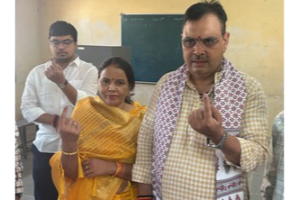A director who is regarded as a prominent face in Bengal’s off-beat cinema can indulge in the occasional luxury of contrived entertainment. Awards and recognitions have come in a steady stream for Kaushik Ganguly for whom the artistic challenges have obviously been as satisfying as the social and moral perspectives woven into his work.
But there could be space for relaxed drama as well. However, what appears to be virtually lost in Drishtikone is the original energy that he may have extended to the popular format.
There are veiled references to an organised racket in organ transplants and the agonising process of seeking criminal justice. But eventually the issues, including the complexities of sustaining family bonds, are drowned in the glossy concoction of thrills and middle-aged romance.
The smartness in presentation and acting styles constitute the biggest assets in a film that moves away from the thinking processes that have distinguished the director’s work. The craftsmanship recalls the extraordinary experiments in Shabdo and the lyrical idiom of Bisarjan.
It is a different canvas in Drishtikone where Prasenjit and Rituparna Sengupta share a chemistry that guides the script more than anything else. Even in the days when Uttam Kumar and Suchitra Sen had made an irresistible combination, directors from Ajoy Kar to Asit Sen had concentrated on the social and human elements drawn predominantly from available literary sources to reinforce the popular objectives.
Almost 50 years down the line, it would appear that film-makers claiming the intelligence to write their own screenplays prefer to work on tailormade situations. The external polish that comes from technical skills cannot conceal the clichés that become an unmistakable instrument in the treatment of the relationship. This is not what one would have expected of a director who has revealed a distinct departure from convention.
What is worse is the contrived overlapping of the mystery and the extra-marital affair. It divides the film into two compartments — which cannot finally be harmonised with the overall impact. It begins with a death of a man about which there are deep suspicions in the family and then moves to the interaction between the man’s wife and a lawyer who is approached to solve what seems to be a mystery.
The lawyer and his attractive client sustain a certain degree of complexity in their respective personalities which is promising to begin with but eventually fall prey to the easiest option. Whether the lawyer and his assistant can proceed in the way they do and whether or not the woman has given up on other investigating agencies are questions that are not answered.
Screenplays claim some licence but they cannot escape some of the obvious holes in the narrative. This is more so when some of the cold facts of the case are kept hanging too long while the lawyer is made to jump from the tenderness of his middle-aged heart to the role of a detective with the police making not more than a casual appearance only at the fag end.
All this would seem to be the handiwork of a writer-director who is unsure about his primary objectives. He produces a trail of red herrings without allowing the investigation to take its natural course.
Finally, it is diluted by the extra-marital affair that is lost in predictable detail — a dash of intimacy, larger doses of sweetness revolving around family bonds and a holiday in Puri that allows a colourful diversion with the lawyer’s wife claiming the innocence and anxiety of “a typical housewife”.
After all the radical impressions of his earlier films, Ganguly is perhaps obliged to do justice to the Prasenjit-Rituparna chemistry as much as to the protection of a time-honoured institution. The film would hardly indeed do justice to the intelligence or temperament of a thinking audience or to the standards that the director has set for himself.
What he does instead is to draw the kind of performances that finally rise above the clichés. The best performance comes from the director himself mainly because the character — the dead man’s elder brother is spared any kind of popular expectation.
The problem is that the audience is led into a chain of half-truths, deliberately or otherwise through the bizarre device of a prolonged interview with the lawyer’s assistant whereas the real investigators have virtually no role to play.
Through this maze of improbability, Ganguly comes up with a superb performance. The other character to acquire interesting shades is the lawyer’s wife, played by Churni Ganguly, who must reconcile her traditional virtues with a desperate effort to save the marriage without the explosiveness of the wronged woman.
If there is anything that makes the film watchable, it is the restrained quality of the performances.
The mood has been defined from the start. The two stars had to fall into that pattern with all their experience of using the expressions and gestures to strike the right tones. There was little else they could do to lift their performances.
The editing is elegant enough to assemble the bits and pieces till the final burst brings all the revelations in true fashion. In the process, the director may have pleased the market with the right proportions of popular treatment but eventually removed the film from any serious debate.











